Asus ProArt PA329Q 32-inch UHD Pro Monitor Review
If you’re in the market for a premium professional wide-gamut monitor, it makes sense to add high pixel density to your list of criteria. To that end, we’re looking at Asus’ PA329Q today. It’s a 32-inch IPS panel with Ultra HD resolution.
Why you can trust Tom's Hardware
Grayscale, Gamma & Color
Grayscale Tracking
Our grayscale and gamma tests are described in detail here.
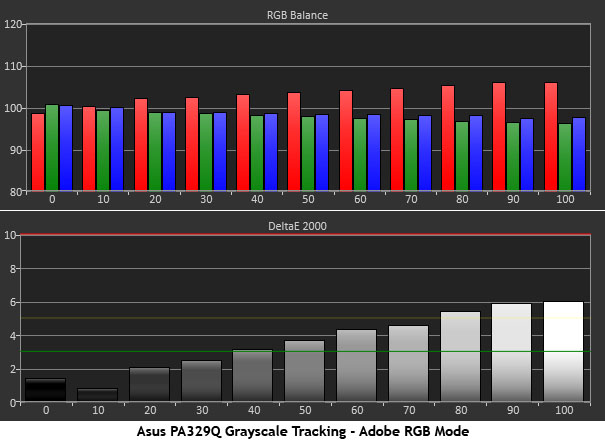
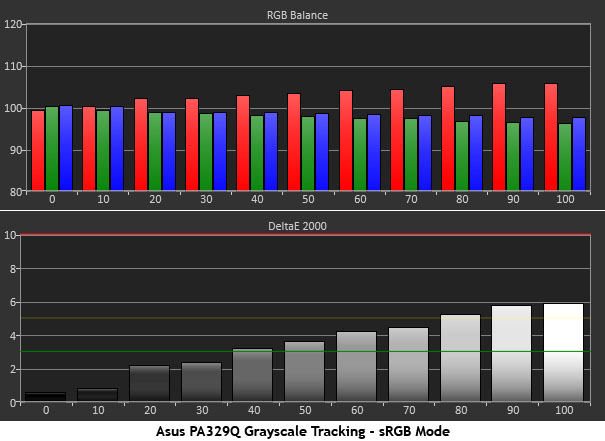
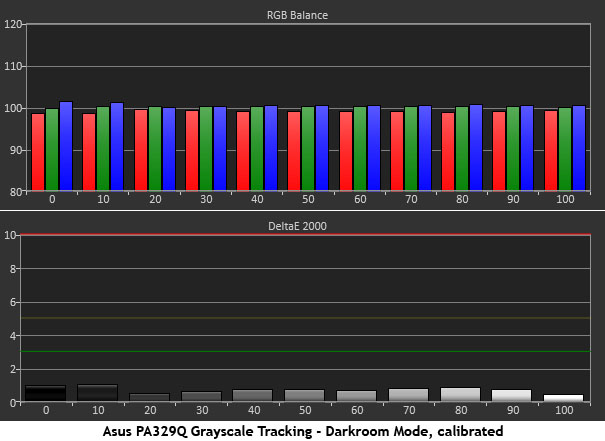
We started our tests in the fixed Adobe RGB mode. There are no adjustments available here and output is locked at 170cd/m2. The chart indicates a slightly warm rendering with visible errors beginning at the 50-percent point. We don’t consider this a huge issue but a premium factory-calibrated monitor should measure a little better out of the box. The sRGB mode posts a nearly-identical result. The red tint increases hand-in-hand with brightness making the whitest highlights a little too warm in hue. Calibrating the Darkroom mode is the best way to achieve perfect grayscale tracking. There are no visible errors here and all values are below 1dE. This is excellent performance.
Comparisons
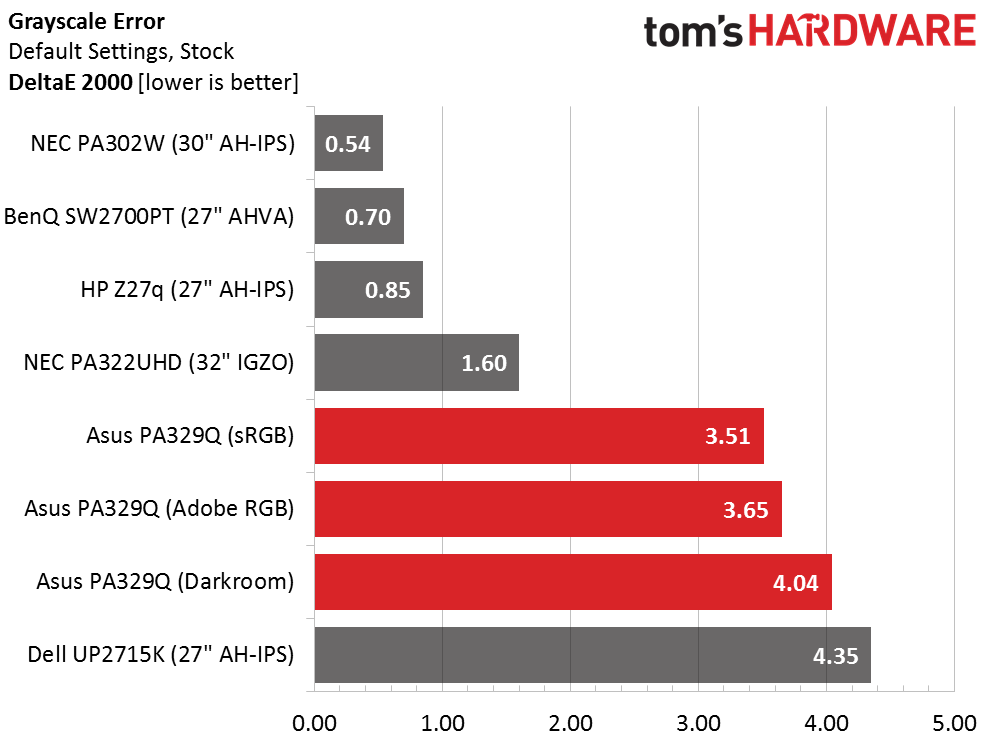
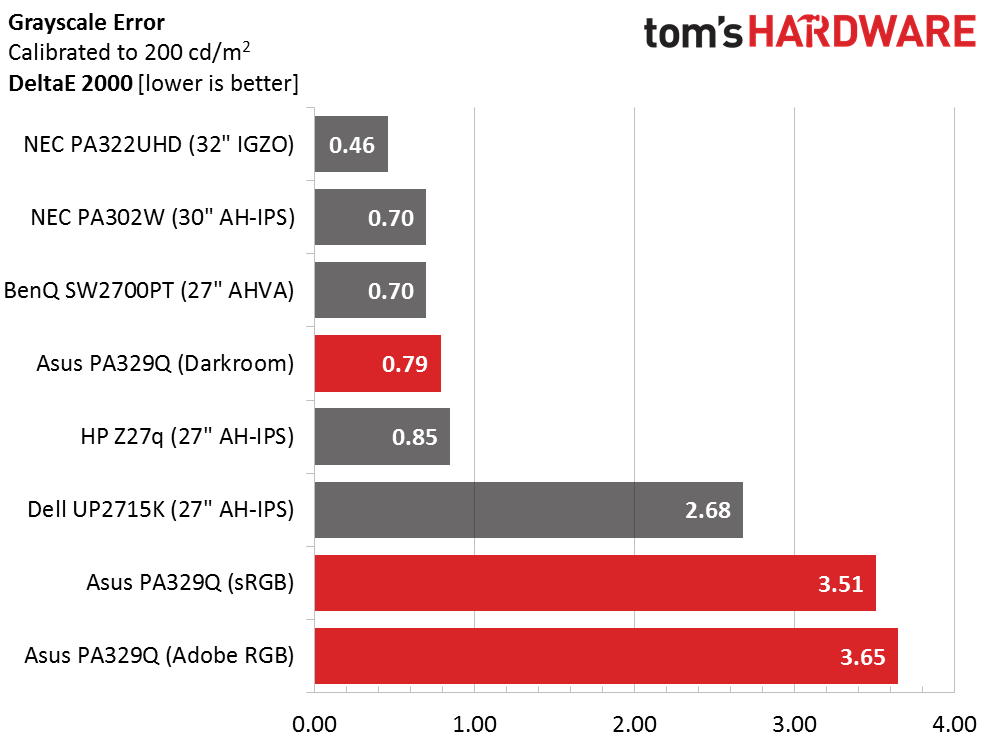
The top four screens are what we expect from professional-grade gear. Asus has come up a little short in this particular test. Even so, we’d still pick the sRGB and Adobe RGB modes as our go-to presets because color and gamma benchmarks reveal far better results. Darkroom mode can be calibrated to a high grayscale standard but the caveat is an over-saturated red primary. We’ll show you that chart below. Since sRGB and Adobe RGB are fixed, we couldn’t improve those numbers. And Asus’ included software could not be tested with our equipment.
Gamma Response
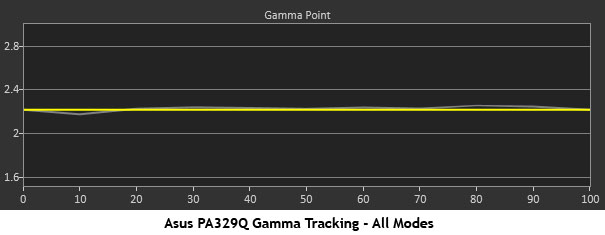
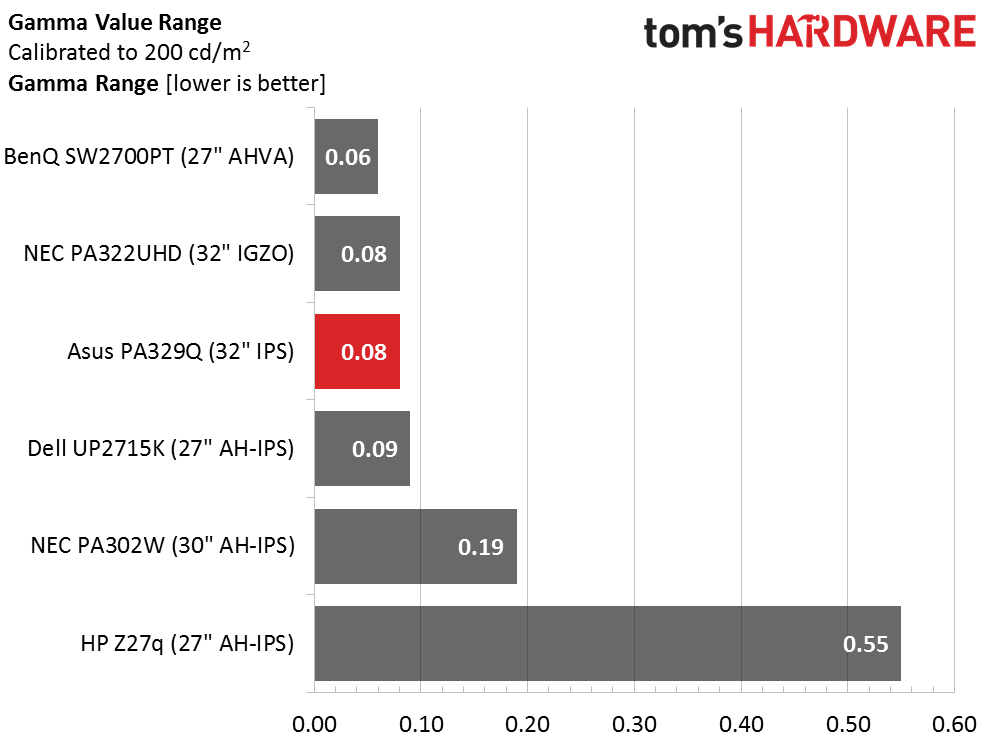
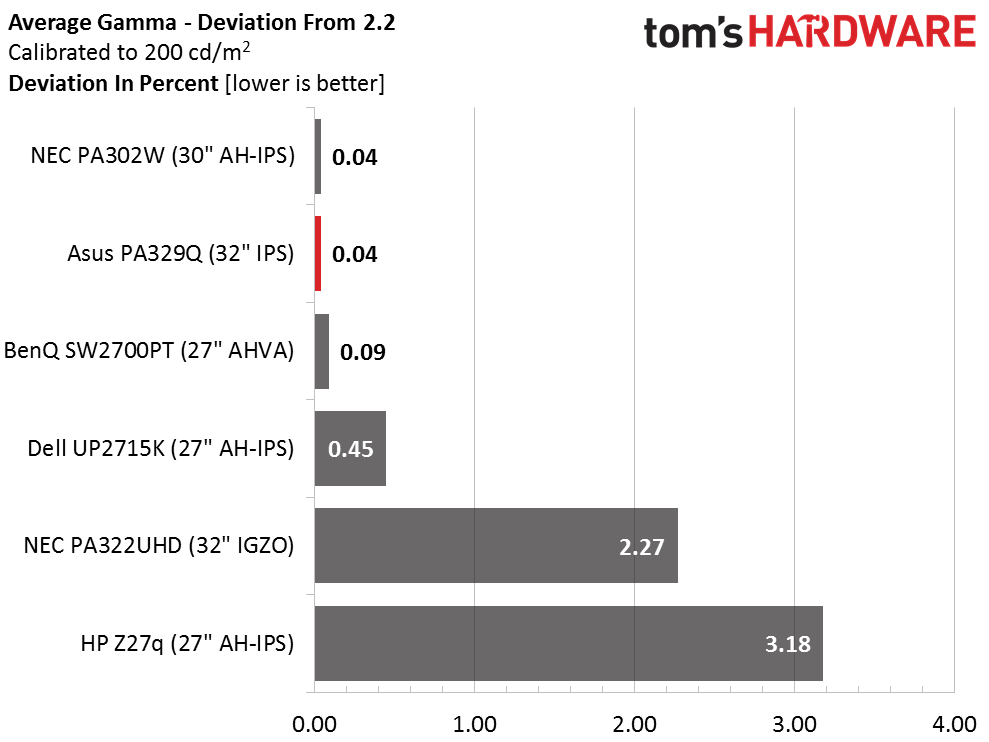
Regardless of which image preset you choose, gamma tracks perfectly at 2.2 and every other possible setting. With only a .08 range of values, there is nothing to complain about here. Only the SW2700PT scores higher.
A .04-percent deviation means the PA329Q scores a 2.21 average value at an indicated 2.2 setting. It’s nice to know the other presets are equally accurate. This aspect of the Asus’ performance is without fault.
Color Gamut And Luminance
For details on our color gamut testing and volume calculations, please click here.
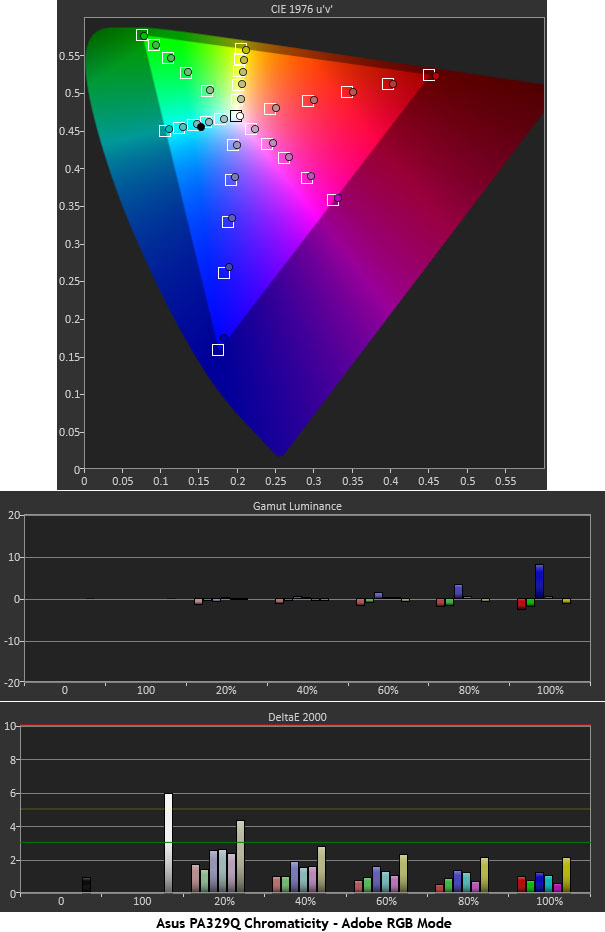
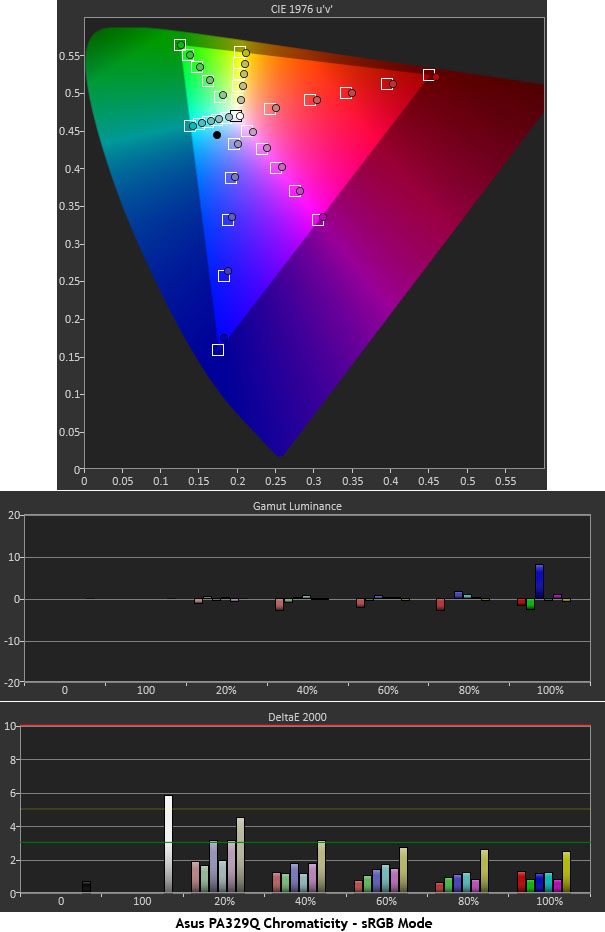

Despite less-than-stellar grayscale numbers, the PA329Q nails the targets for color gamut and luminance. While 100% blue is a tad under, its increased luminance makes up for that deficiency. The resulting errors are super low. The sRGB mode measures equally well, and like the Adobe RGB preset, meets the specs on the included calibration data sheet. Aside from a slightly warm white point, both modes are very accurate and suitable for color-critical applications.
Get Tom's Hardware's best news and in-depth reviews, straight to your inbox.
Though gamma and grayscale are perfect in the Darkroom mode, it suffers from the PA329Q’s native red primary which is quite over-saturated. If this is not an issue in your particular application, Darkroom makes for a workable solution. We tried using the 6-axis saturation adjustment to fix it but only succeeded in reducing red’s luminance even further.
MORE: Best Gaming Monitors
MORE: Best Professional Monitors
MORE: How We Test Monitors
MORE: How To Choose A Monitor
MORE: All Monitor Content
Comparisons
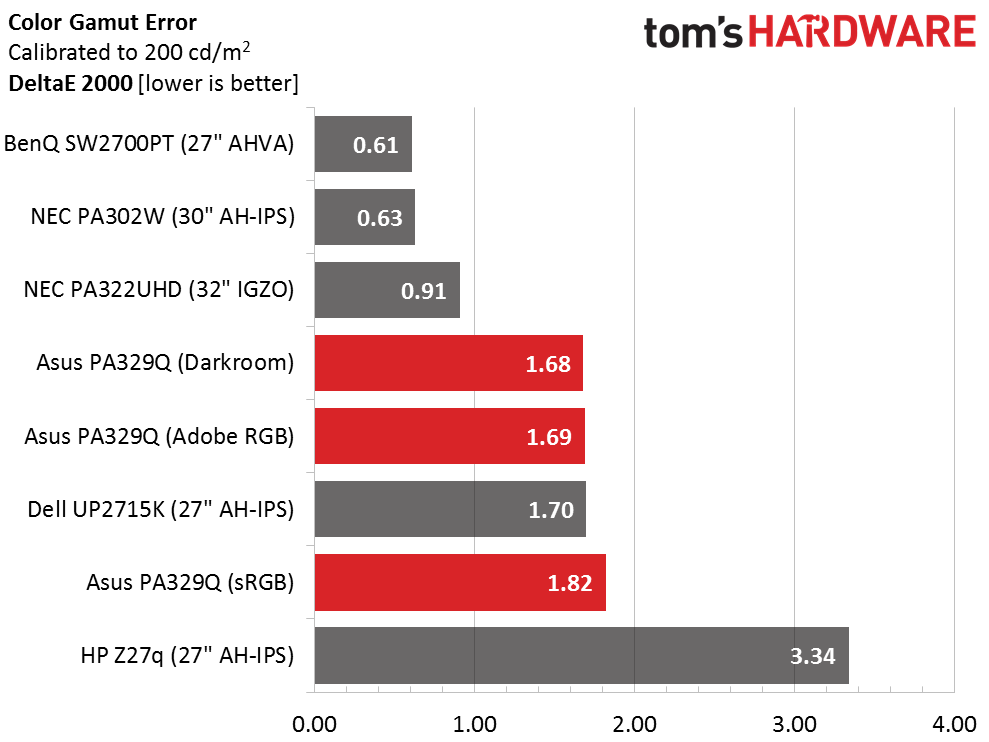
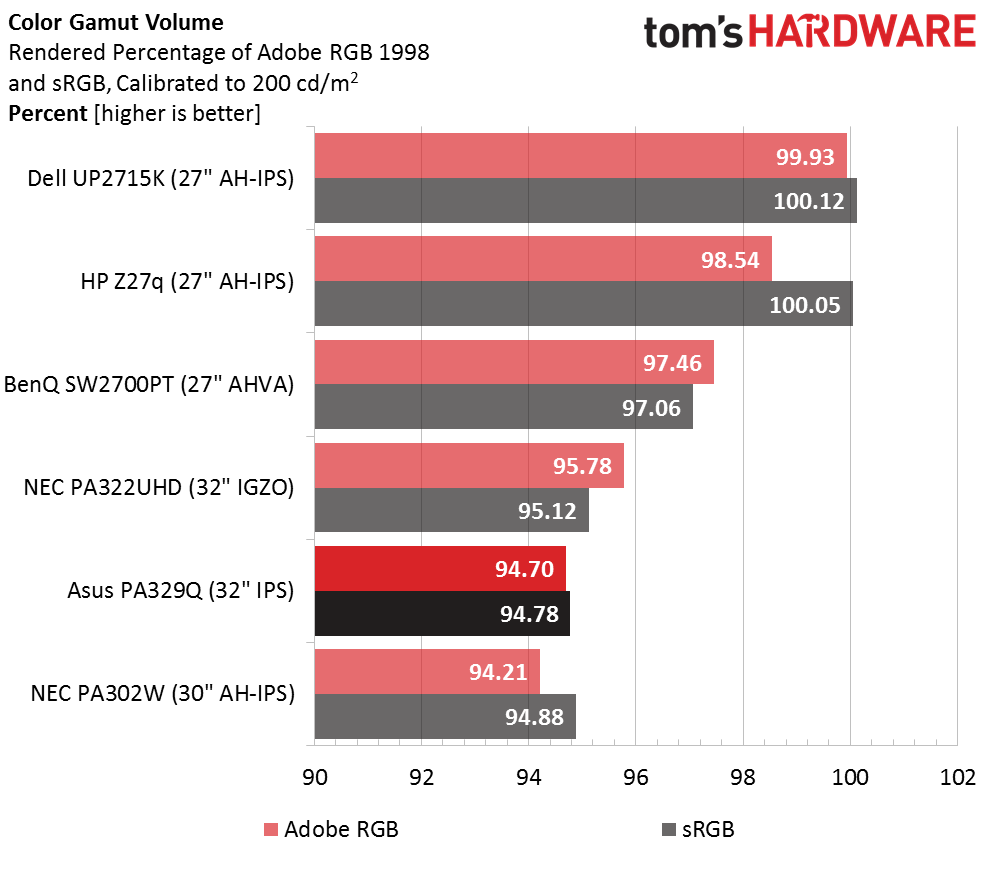
Despite a few flaws, overall color accuracy is only a bit behind the other pro screens here. The red errors in Darkroom mode are visible but all other colors look perfect to the eye. And there are no problems in Adobe RGB or sRGB.
A slightly under-saturated blue primary reduces gamut volume just a bit for both sRGB and Adobe RGB. This is nothing that a custom ICC profile can’t compensate for. It seems only the 5K screens can approach 100% for both standards.
Current page: Grayscale, Gamma & Color
Prev Page Brightness & Contrast Next Page Viewing Angles, Uniformity, Response & Lag
Christian Eberle is a Contributing Editor for Tom's Hardware US. He's a veteran reviewer of A/V equipment, specializing in monitors. Christian began his obsession with tech when he built his first PC in 1991, a 286 running DOS 3.0 at a blazing 12MHz. In 2006, he undertook training from the Imaging Science Foundation in video calibration and testing and thus started a passion for precise imaging that persists to this day. He is also a professional musician with a degree from the New England Conservatory as a classical bassoonist which he used to good effect as a performer with the West Point Army Band from 1987 to 2013. He enjoys watching movies and listening to high-end audio in his custom-built home theater and can be seen riding trails near his home on a race-ready ICE VTX recumbent trike. Christian enjoys the endless summer in Florida where he lives with his wife and Chihuahua and plays with orchestras around the state.
-
IQ11110002 Now release a ROG Swift version 32inch 4k 120hz IPS G Sync.Reply
And make the LED ring and LED ROG logo RGB so people can match the rest of their system!
Their concept 27 inch 4k is too small(I own the 28inch Samsung UD590) and the ideal 40 inch is too big for most desk pc's, 32 is the sweet spot in my opinion and I would buy it. -
KenZen2B I could not find any mention of HDR for this product or did you forget to include that information ?Reply
For any future reviews for UHD monitors, please include information on HDR, WCG, and if the DP can be upgraded to 1.3.
Thanks for the info. -
nikoli707 Reply18507723 said:I could not find any mention of HDR for this product or did you forget to include that information ?
For any future reviews for UHD monitors, please include information on HDR, WCG, and if the DP can be upgraded to 1.3.
Thanks for the info.
clearly says rec2020 which is the standard hdr will get up to in the future. -
bit_user Reply
I haven't read the actual text of ITU-T Rec BT.2020, but I believe the HDR formats are optional. Is that not so?18507891 said:
clearly says rec2020 which is the standard hdr will get up to in the future.18507723 said:I could not find any mention of HDR for this product or did you forget to include that information ?
For any future reviews for UHD monitors, please include information on HDR, WCG, and if the DP can be upgraded to 1.3.
Personally, I don't even care about HDR, in a non-OLED display. The mere fact that you get 10-bit and an expanded color gamut is enough, for a display like this.
-
ngaio Did Asus send a hand-picked monitor for review? Or did Tom's purchase it retail? The uniformity results are very competitive indeed! My expectation with a mid-range 4K panel in 2016 is that panel uniformity will be uneven, given the reports of folks who have purchased this model from Asus and comparable other brands.Reply -
Light Illusion Without the ability to user true 3D LUT calibration such 'professional' displays really are not professional.Reply
Not being able to control gamut is the issue - for true volumetric colour accuracy you need 3D LUT based calibration.
As for UHD, that is really just resolution.
WCG is the colour gamut (Rec2020 for example)
And HDR is high dynamic range (high peak white values).
However, the UHDTV Alliance is attempting to link all three, via its 'Ultra HD Premium' specification.
(There is info on UHDTV, some of the issues, etc, as well as more about 3D LUT calibration here - please note this is our commercial website, but we have a lot of information there that is available for all to review: http://www.lightillusion.com/uhdtv.html) -
TeamColeINC What do I have to do for them to make 40" models? I know there are the Korean 40" UHD monitors, but they all have issues and about a 25% chance of getting a lemon....Reply -
ZippyPeanut A PROFESSIONAL monitor with a 16:9 aspect ratio?! This disqualifies it from consideration even if it were a third of its current price. 16:9 kills it as a professional monitor.Reply -
Ben Archer The Color Gamut And Luminance charts are nearly unreadable due to size and JPEG compression artifacts. The carousel is really unkind to these charts.Reply